How China and Hong Kong implement the enforcement of their recent ivory bans will be crucial for the recovery of elephants and other species, write Vanda Felbab-Brown and Shoshanah Tischler. And Japan, a prominent remaining legal market for ivory, should now, too, implement a ban, they argue. This piece was originally published by Vulcan Inc.
As the world celebrates the World Wildlife Day, significant progress has been achieved toward suppressing ivory trafficking, but much remains to be done. On January 31, Hong Kong’s legislators banned ivory trade, with a phased implementation to be completed by 2021. The vote came a month after China completed the implementation of its own ban ending legal sales of ivory in the country. This is welcome news. Environmental activists long pointed out that the legal markets served to launder ivory from poached elephants, contributing to their great slaughter over the past ten years. However, in the absence of demand reduction, bans on commodities produce illegal markets as traffickers make high profits supplying demand. Therefore, how China and Hong Kong implement the enforcement of their ivory bans will be crucial for the recovery of elephants and other species.
China has long been the number one consumer of ivory in the world. International trade in ivory was banned in 1989. However, in 2008, China was allowed to buy ivory in a one-off international sale, and China became the largest market for legal ivory. Expanding demand then fueled massive poaching of elephants and expansion of the illegal markets in ivory, including in Hong Kong.
The illegal ivory market in China and overall demand for ivory has directly contributed to the poaching scourge in Africa—resulting in a cumulative loss of 144,000 elephants between 2007-2014, according to the Paul G. Allen’s Great Elephant Census. China’s announcement of the ban’s implementation by the end of 2017 seems to have suppressed demand, with the price of ivory reported declining by 65%, according to the NGO Save the Elephants. While the latest report from the Convention on International Trade in Endangered Species of Wild Fauna and Flora (CITES) shows reductions in elephant poaching in Africa, just last summer, Hong Kong authorities seized a 7.2 ton container filled with ivory, the world’s largest ivory seizure in history and worth more than $9 million. Thus, after the announcement of the bans, China and Hong Kong need to take explicit and public enforcement measures to eliminate all ivory markets.
Diligently enforcing bans of particular commodities is critical for their success since they stimulate illegal trade. The illegal trade in wildlife has long been prevalent in China and Hong Kong. Local enforcement in source countries before animals are poached is by far the most effective policy measure. Its effectiveness is further enhanced when it is complemented by shutting down wildlife retail markets in demand countries.
Multiple enforcement options are available to China and Hong Kong to implement enforcement of their respective bans. The more time that lapses before implementation, the greater opportunities illegal traders have to develop evasion and corruption strategies. Thus, Chinese and Hong Kong law enforcement officials should map the distribution networks of as many legal and illegal traders as possible and inform them that their activities will be diligently monitored, and any violations strictly punished. Because the ivory trade is believed to be concentrated among relatively few investors, their early identification should not be difficult. Shutting down internet websites and private social media platforms and arresting such traders are crucial steps.
In addition to robust penalties for traders, Chinese and Hong Kong authorities can consider the use of mild, swift, and certain penalties for low-level buyers attempting to acquire ivory after the bans come into force. Such penalties could include escalating fines as well as compulsory public works and shaming strategies, such as publishing lists of violators.
Implementing such wildlife enforcement measures in China and Hong Kong has many advantages over such implementation in poorer countries with low capacity and intense corruption, particularly given the current overall crackdown on crime and corruption in China. Since president Xi Jinping came to power, Chinese law-enforcement authorities have intensely targeted various criminal enterprises, from the drug trade to unregistered fashion models. They have also gone after corruption, with top officials receiving severe sentences for a variety of offences. The deterrent effects of law enforcement in China are currently high.
The Chinese and Hong Kong governments and NGOs should continue their strong demand-reduction efforts. Structuring campaigns around immediate material costs, such as to one’s prestige and dating prospects, is highly effective. So how about campaigns showing attractive people rejecting suitors who display ivory trinkets?
Through its ivory ban, China has assumed important global leadership and environmental stewardship in countering wildlife trafficking. Ahead of the October 2018 London conference on illegal wildlife trade, China should roll out enforcement measures to fully eliminate its ivory markets. It can reinforce its leadership by also diligently enforcing its prohibitions against trafficking in other species, including pangolins, bears, tigers, birds, reptiles, and fishes such as sharks and totoaba. With China and Hong Kong taking bold action against elephant poaching, the onus is on Japan, now one of the most prominent remaining legal markets for ivory, to show its own leadership role in countering wildlife trafficking by banning ivory.
The Brookings Institution is committed to quality, independence, and impact.
We are supported by a diverse array of funders. In line with our values and policies, each Brookings publication represents the sole views of its author(s).
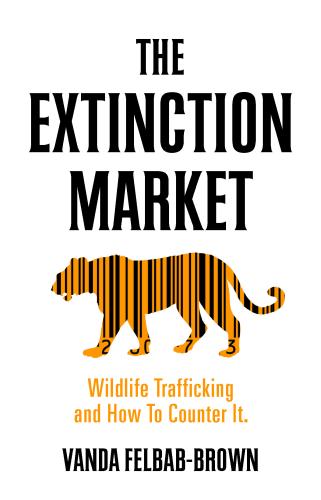
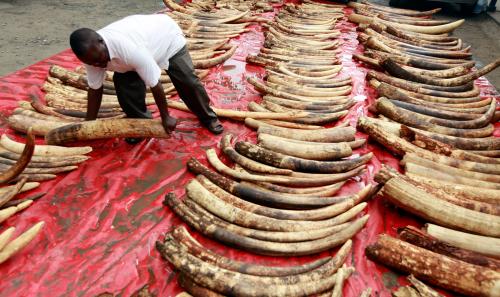
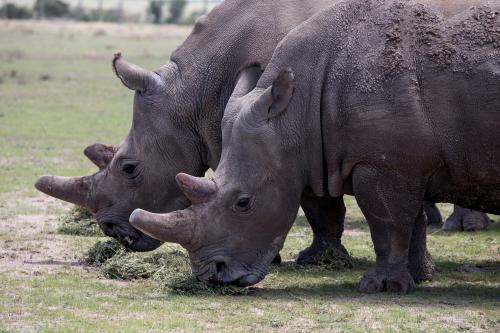



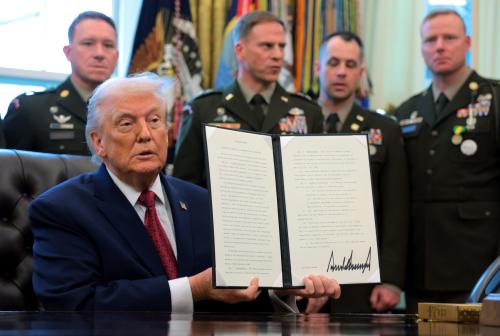
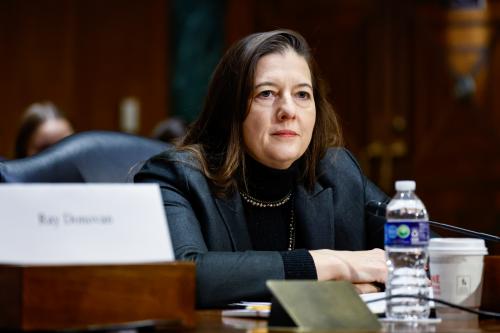
Commentary
Op-edAfter the ivory bans, diligent enforcement is needed
March 2, 2018